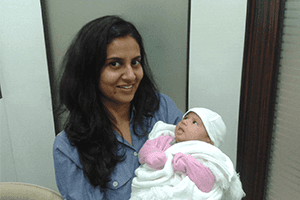Female infertility may stem from many causes, such as hormonal deficiencies, problems in the reproductive organs, and some illnesses. Complications from surgery and certain medications may also impair fertility.
The most likely causes for female infertility are:
- Pelvic Inflammatory Disease (PID) – PID is the most common cause of infertility worldwide. It’s an infection of the pelvis or one or more of the reproductive organs, including the ovaries, the fallopian tubes, the cervix or the uterus. Sometimes PID spreads to the appendix or to the entire pelvic area.PID usually stems from the same bacteria that cause sexually transmitted diseases, such as gonorrhea or chlamydia. Chlamydia, in fact, causes 75 percent of fallopian tube infections.PID may also develop from bacteria that reach the reproductive organs through abortion, hysterectomy, childbirth, sexual intercourse, use of an intrauterine (IUD) contraceptive device or a ruptured appendix.Not only does PID cause infertility, but it may also lead to ectopic pregnancy and blood poisoning, a potentially fatal complication.
- Polycystic ovary syndrome (PCO) – This condition affects 5 million American women and is another major cause of infertility. In PCO, the ovaries produce high amounts of male hormones, especially testosterone. LH levels also remain abnormally high while FSH levels are abnormally low; thus, the follicles do not produce eggs. Instead they form fluid-filled cysts that eventually cover the ovaries.Recent research indicates that PCO is caused by the failure of muscle, fat and liver cells to accept glucose (the cellular fuel made from the food that humans eat). As a result, the pancreas begins churning out large amounts of insulin, a hormone that usually ushers glucose from the blood to the body’s cells. This extra insulin plays havoc with the ovaries, as well as other parts of a woman’s body.PCO not only causes infertility, but also increases the risk of diabetes, cancer and even heart disease. The symptoms include:
- Excessive facial hair
- Thinning hair
- Acne
- Depression
- Unexplained weight gain
- Irregular or no periods
- High insulin or cholesterol readings
- Endometriosis – This disease is another common cause of female infertility.Endometriosis refers to a condition in which sections of the uterine lining implant in the vagina, ovaries, fallopian tubes or pelvis. These implants eventually form cysts that grow with each menstrual cycle, and may eventually turn into blisters and scars. The scars can then block the passage of the egg.
- Other sexually transmitted diseases such as genital herpes can decrease fertility.
- Ovary Problems – Decreased production of any one of the five hormones that regulate a woman’s reproductive cycle may result in infertility. Problems within the ovaries may inhibit reproduction as well. Instead of releasing an egg, the ovarian follicle remains empty, fails to rupture or traps the egg.
- Hormonal Problems – Adrenal or thyroid deficiencies may cause hormonal and ovarian problems.Some women produce excess amounts of prolactin, a hormone that normally stimulates the production of breast milk. Prolactin can also prevent ovulation. High levels of prolactin in a woman who is not nursing may indicate a pituitary tumor. It can also result from the use of oral contraceptives.
- Immune System Problems – Women may develop antibodies or immune cells that attack the man’s sperm, mistaking it for a toxic invader. Certain autoimmune diseases, in which the woman’s immune cells attack normal cells in her own body, may also contribute to ovarian problems.
- Luteal Phase Defect – In a luteal phase defect, a woman’s corpus luteum – the mound of yellow tissue produced from the egg follicle – may fail to produce enough progesterone to thicken the uterine lining. Then the fertilized egg may be unable to implant.
- Fibroids – Fibroids, or benign growths, may form in the uterus near the fallopian tubes or cervix. As a result, the sperm or fertilized egg cannot reach the uterus or implant there. Fibroids in the uterus are very common in women over age 30.
- Other Uterine Problems – Abnormal reproductive organs or endometritis (an abnormal swelling of the uterine lining) may make it difficult for the fertilized egg to implant.
- Surgical Complications – Scar tissue left after abdominal surgery can cause problems in the movement of the ovaries, fallopian tubes, and uterus, resulting in infertility. Frequent abortions may also produce infertility by weakening the cervix or by leaving scar tissue that obstructs the uterus.
- Uterine muscle problems – Some women may produce weak, infrequent or abnormal contractions in the uterus. During ovulation, these contractions usually push the sperm up to the fallopian tubes.
- Poor quality cervical mucous – Sometimes a woman’s mucous fails to thin around the time of ovulation, and consequently it prevents the sperm from traveling through it. A cervical infection may also be the cause.
- Illness – Certain diseases, such as diabetes, kidney disease or high blood pressure may cause infertility. Ectopic pregnancy and some urinary tract infections may also elevate the risk of infertility.
- Medications – Many medicines, such as hormones, antibiotics, antidepressants, and pain killers may bring on temporary infertility. Commonly used medications such as aspirin and ibuprofen can also impair fertility if taken mid-cycle. Acetaminophen (Tylenol) pills can reduce the amount of estrogen and luteinizing hormones in the body, impairing fertility.
- Premature Menopause – Some women may experience premature menopause, when their ovaries stop producing eggs. Often the cause is excessive exercise or anorexia.
Other causes: some other contributors to infertility include excessive exercise, stress or anorexia.
You can visit here to know about our treatment program.







